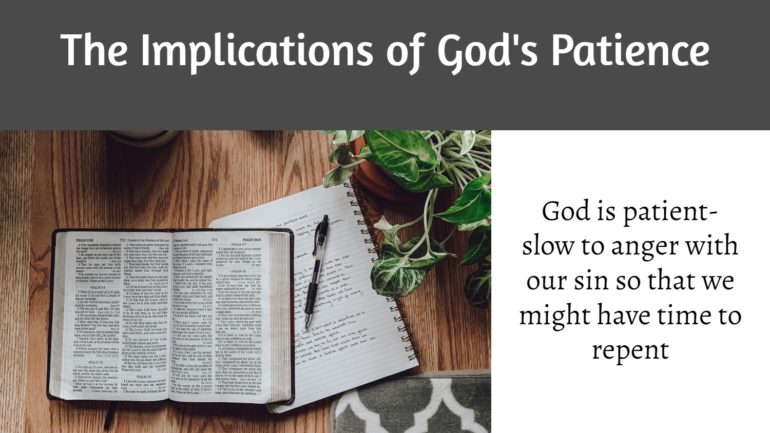God’s patience with our sin allows us time to repent and return to Him. It also gives us an example to follow in being patient with sinners, situations, and suffering.
We’ve all heard the saying, “patience is a virtue.” But apparently, it’s not a virtue that is in high demand these days. In fact, instead of seeking to develop patience, more and more things are being developed that eliminate any need for patience. You don’t have to wait for a meal to be cooked; just go through the drive-thru and get fast food. You don’t have to wait long for a package to be delivered; Amazon offers same-day delivery. When we do find ourselves in a situation where waiting is necessary, when we get in the slow line at the grocery store or behind a slow driver on the highway, we don’t handle it very well. We live in a world in instant gratification. Like my toddler, we get impatient if we don’t get what we want when we want it.
We also get impatient if things don’t go the way that we expect them to. We think that our children should act a certain way, and get impatient with them when they don’t meet our expectations. Our husbands or our friends should make us happy, and we get impatient with them when they don’t. We think our lives should be easy, and we get impatient when things get tough.
What Is Patience?
What is patience, though? How should we react when things take longer than we would like, or people don’t act the way that we expect them to, or our lives don’t go the way we want?
The Bible often uses the word longsuffering to refer to patience, and it means “slow to anger.” When so many irritating things just push our buttons, patience demands that we don’t get angry. Instead, we are to be longsuffering, or we are “suffer long” in spite of the irritations. We don’t get angry when our children interrupt us for the millionth time, or when we’re stuck behind a tractor on the highway with no opportunity to pass. We don’t get angry when people let us down, or when life doesn’t turn out the way we had planned.
The Patience of God
God is our example of patience. He is described as patient or “slow to anger” many times throughout Scripture (see Ex. 34:6; Psalm 103:8; Jonah 4:2; Num. 14:18; Nahum 1:3). Arthur Pink describes God’s patience as “the power of control which God exercises over Himself, causing Him to bear with the wicked and forbear so long in punishing them.” So patience actually has to do with self-control, being able to restrain your anger.
God’s Self-Control
So, when we talk about God being patient, it means that He’s exercising self-control and not becoming angry over our sin. Instead of immediately handing out the punishment that people deserve, He withholds judgment for a time. That doesn’t mean that judgment and punishment will never come, but it is delayed for a while.
It actually makes sense that God is patient, if you think about it, because it is in keeping with His other attributes. We acknowledge that God is sovereign, meaning He’s in control of all things, and we know that He’s omnipotent, or all-powerful. God has power and control. If He is in complete control and has complete power over creation, then He must also be in control over Himself. Stephen Charnock writes, “God is slow to anger because great in power. He has no less power over Himself than over His creatures.”
Mercy Versus Patience
I want to take a moment to differentiate between God’s mercy and His patience. Mercy is not getting what we deserve, or God withholding the punishment that we deserve. That sounds a lot like patience, so we might confuse the two, but there is a difference.
Mercy is focused on the recipient, or the one to whom mercy is being shown. Patience, however, has to do with the restraint or self-control of the one showing patience. God practices patience when He shows you mercy. His patience results in mercy. His not lashing in anger over sin leads to delayed justice.
God’s Motivation for Patience
If anyone deserves to be angry over sin, it’s God. However, He continually displays patience toward the very creatures who have rejected Him and sinned against Him. Why does God not just strike everyone dead immediately? We find that answer in 2 Peter 3:9:
The Lord is not slow to fulfill his promise as some count slowness, but is patient toward you, not wishing that any should perish, but that all should reach repentance.
Time for Repentance
God is patient in order to give people time to repent. Now a couple things to notice about this verse. It says that God is patient to you. Who is Peter talking about? Well, in 2 Peter 1:1, Peter identifies the audience of the letter as “those who have obtained a faith of equal standing with ours by the righteousness of our God and Savior Jesus Christ.” So going back to 3:9, the recipients of God’s patience are those who have faith in Christ, believers.
It also says that God doesn’t wish any to perish, but that all should repent. What does that mean? This does not mean that God desires everyone to be saved, and is delaying punishment with some misguided hope that everyone will turn to him. That would mean that God desires something that He cannot fulfill, which goes against His sovereignty and omnipotence.
Waiting for the Chosen Ones
I think it fits the context of the passage better to t He doesn’t want any of His chosen ones to perish but wants His chosen ones to repent. That makes more sense. If He really does want everyone to repent, then when would be a good time for judgment? There will always be some that have not yet repented. But if He’s chosen a specific group of people, then one day, the last chosen person will repent. Then God can bring about the events we read about in 2 Peter 3:10-12.
John MacArthur states it this way:
Since the whole passage is about God’s destroying the wicked, His patience is not so He can save all of them, but so He can receive all His own. He can’t be waiting for everyone to be saved since the emphasis is that He will destroy the world and the ungodly…The reason for the delay in Christ’s coming and the attendant judgments is not because He is slow to keep His promise, or because He wants to judge more of the wicked, or because He is impotent in the face of wickedness. He delays His coming because He is patient and desires the time for His people to repent.
The implication of the passage in 2 Peter is that God’s patience is delaying judgment, but that judgment is coming. His patience is only going to last for so long.
Examples of God’s Patience
The Flood
In Genesis 6:11-13, God announces a global flood that will destroy the Earth because of the sin of the people. Then in Genesis 7:6-7, the flood begins. Apparently, some time has passed between these two events. Peter indicates that this time was because of God’s patience (1 Peter 3:20).
We can’t know exactly how long it took to build the ark, but an estimate based on the information given in Genesis 6 would be about 55-75 years, according to Answers in Genesis. The point is that God waited many years, what to us is an entire lifetime, before He finally delivered the punishment that He decided these people deserved.
A Picture of Christ
The story of the ark is a foreshadowing of the work of Christ. God had decided to destroy the earth for the wickedness of humanity. He chose to grant mercy and salvation to a select few. The only way to obtain that salvation was to walk through the door into the ark. God also patiently waited and delayed judgment until everything was ready for His chosen ones to be saved. Do you see the parallels between that story and ours?
God has once again chosen to destroy the earth for the wickedness of mankind. He has chosen those whom He will save, and He has provided the means of salvation through Christ. Jesus describes Himself as “the Door,” and only those who walk through that door into Christ will be saved. Once again, God is patient and delaying judgment until everything is read and all of those whom He chosen are saved.
Other Examples of God’s Patience
God gave the nation of Israel once chance after another even though they continually turned away from Him. King Manasseh of Judah was the worst king that Israel or Judah ever had. Even though he was extremely wicked, he reigned longer than any other king (2 Chron. 1-2). God was patient with Manasseh, because He planned to bring him to repentance (2 Chron. 33:1). Saul of Tarsus persecuted the church, but God patiently waited until the time came for him to be saved
Examples of Jesus’ Patience
Jesus also sets an important example for us in how to be patient. During His life on Earth, He encountered all the same frustrations and irritations and trials that we do. Yet, He endured them all with patience. There are three primary areas where Jesus exercised patience:
Patience with Sinners
Jesus grew up in a family just like we did. He had siblings. I’m sure there were times when His brothers and sisters annoyed Him, but He never reacted with anger. He was patient with them.
During His ministry, He spent a lot of time with His apostles. They didn’t always understand what He was doing. Sometimes they did things that must have been frustrating, but Jesus was always patient with them.
People also followed Jesus and crowded around Him, seeking healing and miracles. That must have been overwhelming, but Jesus was patient every time.
Patience with Situations and Circumstances
Once Jesus started His ministry, He faced many challenging situations. His life as an itinerant preacher was not easy. He had no home and spent His days walking all over the countryside, sleeping outdoors on the hard ground. Instead of being frustrated with His circumstances, He patiently endured all of the hardships.
Jesus also patiently waited on His Father’s timing in all things. It must have been tempting to begin using His power to perform miracles sooner, but He waited until the time was right (see John 2:4, 7:6). He also patiently waited to do the Father’s will rather than rushing ahead with His own plans (John 6:38).
Patience with Suffering
Jesus was also patient in the midst of suffering. He could have saved Himself from being arrested and beaten. He could have chosen not to go to the cross. Yet He patiently bore the pain and suffering, as we read in 1 Peter 2:21-24:
For to this you have been called, because Christ also suffered for you, leaving you an example, so that you might follow in his steps. He committed no sin, neither was deceit found in his mouth. When he was reviled, he did not revile in return; when he suffered, he did not threaten, but continued entrusting himself to him who judges justly. He himself bore our sins in his body on the tree, that we might die to sin and live to righteousness. By his wounds you have been healed.
Implications of God’s Patience
God’s patience with sinners will only last for a time, so we must tell others about Him.
God is delaying justice now, but judgment is coming. When we think about the coming judgment, that should lead to an urgency to share the Gospel with those around us. It’s hard to think about people we know and love spending an eternity in hell. Our love for them should motivate us to tell them exactly what’s waiting for them if they don’t repent. It may not be easy. Most people don’t want to hear that they are sinners on the way to hell. We may hold back for fear of damaging our relationship with that person. But if we love them, we must tell them.
We must reflect Jesus’ patience with sinners, with situations, and with suffering.
When people sin against us, or just made us mad, we must be patient. Rather than lashing out in anger, we should turn the other cheek. When things don’t go the way that we want, with life is tough and painful, we must be patient. With Paul, we must say, “For this light momentary affliction is preparing for us an eternal weight of glory beyond all comparison, as we look not to the things that are seen but to the things that are unseen. For the things that are seen are transient, but the things that are unseen are eternal” (2 Corinthians 4:17-18). When we focus on our situation, it’s easy to be impatient or angry, wanting things to change. But we must remember that God has purpose in our suffering. If we are just patient, then things will get better. Maybe not on this earth, but certainly in heaven.
This post is part of a series entitled Seeking God’s Face: Discovering the God of the Bible, which is based on a Bible study I’m teaching at my church. In this study, we’ll be rethinking our impressions of God by searching the Scriptures to find out who He really is. You can find other posts, as well as additional Bible study resources, here:
SEEKING GOD’S FACE: DISCOVERING THE GOD OF THE BIBLE
The information in this post was based on the following resources:
In His Image: 10 Ways God Calls Us to Reflect His Character by Jen Wilkin
The Attributes of God by Arthur W. Pink
Taste and See that the Lord Is Good: A Study of the Attributes of God by Joel James
The MacArthur Bible Commentary by John MacArthur
Unless otherwise noted, Scripture quotations are from The ESV® Bible (The Holy Bible, English Standard Version®), copyright © 2001 by Crossway, a publishing ministry of Good News Publishers. Used by permission. All rights reserved.







Seeking God's Face: Discovering the God of the Bible - She Lives Worthy %
[…] The Implications of God’s Patience (blog post) […]